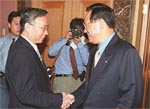 |
Chen Shui-bian Urged to Support 'One China'

Chen Shui-bian Urged to Support 'One China'
|
A senior Taiwan affairs official Monday accused new Taiwan leader Chen Shui-bian of reversing the 1992 consensus between Beijing and Taipei on how to define cross-Straits relations.
"The new (Taiwan) leader's attempt to deny the consensus (on sticking to the one-China principle) ... is undoubtedly setting hurdles to the resumption of talks,'' said Li Yafei, secretary-general of the Beijing-based Association for Relations Across the Taiwan Straits (ARATS).
Li made the remarks Monday while meeting a 26-member delegation from Taiwan's former ruling Kuomintang.
The delegation, led by a Taiwan "member of parliament,'' He Zhihui, arrived in Beijing on Sunday for a four-day visit at the invitation of the ARATS.
Amid signs of bilateral efforts to ease cross-Straits tension, the visit followed last week's trip by Taiwan's pro-reunification New Party, the first to the mainland in the name of a Taiwan political party.
Li said the only agreement reached in 1992 between ARATS and its Taiwan counterpart, the Straits Exchange Foundation (SEF), was the pursuit of reunification and adherence to the one-China principle.
"There has not been a so-called consensus that two sides of the Taiwan Straits would have their own interpretation of the one-China principle,'' Li stressed.
The secretary-general said his association only agreed that under the one-China principle, the political difference could be shelved and left for further discussion during routine negotiations.
But the Taiwan authorities have distorted the 1992 consensus by coming up with only different interpretation of one-China while leaving out the principle itself, Li said.
"The principle has long been a common stance held by the two sides of the Taiwan Straits and a basis for cross-Straits co-operation. It is not something that we are forcing upon Taiwan,'' said Li.
He reiterated the urge for the Taiwan leader to explicitly embrace the one-China principle.
"Accepting the principle is the only way out of the current stalemate facing the cross-Straits ties,'' he said.
Li ruled out the possibility of resuming talks between ARATS and SEF without going back to the one-China principle.
Moreover, only under the principle can direct postal, commercial and shipping links between the mainland and Taiwan be realized at an early date, Li said.
Li expressed his hope for more meetings with all anti-independence parties and groups from Taiwan in a bid to improve cross-Straits ties.
The Kuomintang delegation leader Her also urged Chen Shui-bian to accept the 1992 consensus and help break the ice.
He Zhihui said the Kuomintang Party will exert its utmost efforts to oppose any move leading to "Taiwan independence.''
"We hope for a win-win situation for both sides through cross-Straits consultations and talks,'' said He.
Vice-Premier Qian Qichen and ARATS Chairman Wang Daohan are also scheduled to meet the delegation in Beijing.
The ARATS and SEF are semi-official bodies set up in Beijing and Taipei to handle bilateral talks in the absence of official contacts.
ARATS Chairman Wang Daohan held a summit with his Taiwanese counterpart Koo Chen-fu in Singapore in 1993, leading to a series of technical negotiations.
Talks broke off in 1995 after then-Taiwan leader Lee Teng-hui visited the United States.
Wang's planned visit to Taiwan last year was put off indefinitely due to Lee's "two states'' theory, which defines cross-Straits ties as relations between two independent countries.
Tension between Beijing and Taipei rose initially when Chen, from the pro-independence Democratic Progressive Party, came to power in the March election after the Kuomintang lost its over 50-year grip on the island.

In This Section

|